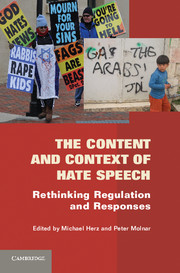Book contents
- Frontmatter
- Contents
- Contributors
- Foreword: Hate Speech and the Coming Death of the International Standard before It Was Born (Complaints of a Watchdog)
- Foreword: Hate Speech and Common Sense
- Acknowledgments
- Introduction
- Part I Overviews
- Part II Refinements and Distinctions
- Part III Equality and Fear
- 16 Hate Speech and Political Legitimacy
- 17 Reply to Jeremy Waldron
- 18 Waldron, Machiavelli, and Hate Speech
- 19 Shielding Marginalized Groups from Verbal Assaults Without Abusing Hate Speech Laws
- 20 Interview with Nadine Strossen
- 21 Interview with Theodore Shaw
- Part IV International Law
- Index
- References
20 - Interview with Nadine Strossen
Published online by Cambridge University Press: 05 June 2012
- Frontmatter
- Contents
- Contributors
- Foreword: Hate Speech and the Coming Death of the International Standard before It Was Born (Complaints of a Watchdog)
- Foreword: Hate Speech and Common Sense
- Acknowledgments
- Introduction
- Part I Overviews
- Part II Refinements and Distinctions
- Part III Equality and Fear
- 16 Hate Speech and Political Legitimacy
- 17 Reply to Jeremy Waldron
- 18 Waldron, Machiavelli, and Hate Speech
- 19 Shielding Marginalized Groups from Verbal Assaults Without Abusing Hate Speech Laws
- 20 Interview with Nadine Strossen
- 21 Interview with Theodore Shaw
- Part IV International Law
- Index
- References
Summary
Peter Molnar: One of the most common justifications for regulating “hate speech” is to prevent grave harms to marginalized groups. According to this argument such speech stigmatizes and demoralizes members of such groups and prevents them from achieving full equality in society. Do you agree?
Nadine Strossen: I totally disagree with the factual premise. And even if I agreed with the premise, I still think that suppressing hate speech would not be an effective solution to the alleged problem.
So, first, I completely dismiss the claim that some people making nasty racist, sexist, or other discriminatory comments necessarily has a severe adverse impact on the individuals who are described. All of us have the ability to reject ideas that are conveyed by various expressions. I speak from experience. I have been the subject of anti-Semitic comments, antifemale comments, anti–civil libertarian comments, personally defamatory comments, and defamatory comments about an organization near and dear to me – and none of it affects my view of myself. It affects my view of the speakers, and of the speakers’ ideas. Quite frankly, to suggest that there is inevitably a direct negative impact on the person who is insulted, I think, is insulting. It suggests that that person doesn’t have enough self-confidence, doesn’t have enough critical capacity. We are not somehow automatically diminished just because some bigot says something negative about us.
- Type
- Chapter
- Information
- The Content and Context of Hate SpeechRethinking Regulation and Responses, pp. 378 - 398Publisher: Cambridge University PressPrint publication year: 2012
References
- 4
- Cited by

